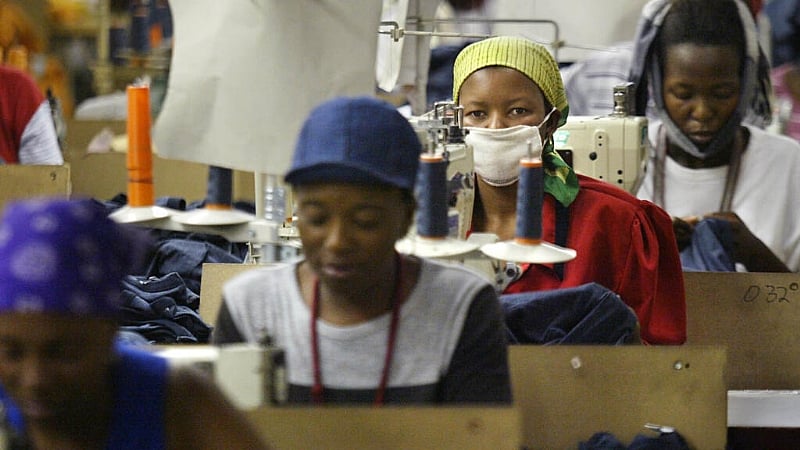President Trump’s imposition of new tariffs, touted as “Liberation Day,” has sent ripples of concern across the African continent, disrupting established trade relationships and potentially jeopardizing economic stability for several nations. The tariffs, set to take effect in April 2024, impose a baseline 10% levy on all imported goods, with additional reciprocal tariffs targeting countries with significant trade deficits with the US. This move marks a significant shift in US trade policy, particularly impacting African nations that have enjoyed preferential trade agreements with Washington for decades. The administration’s justification for the tariffs centers on reciprocity, claiming that they are simply mirroring the tariffs imposed by other countries on US goods. However, critics argue that this approach overlooks the complexities of global trade and the disproportionate impact on developing economies.
South Africa, the second largest US trading partner in Africa after China, has strongly condemned the tariffs, labeling them “unilaterally imposed and punitive” and a barrier to shared prosperity. With substantial exports to the US, primarily in automobiles, agriculture, and pharmaceuticals, South Africa anticipates significant negative impacts. The country has called for urgent renegotiation of a bilateral trade agreement to mitigate the damage. Experts concur, predicting that the tariffs will have far-reaching consequences, forcing a reassessment of existing trade strategies across the continent. The Trump administration’s approach appears to be one of deliberate disruption, using tariffs as leverage to compel other countries into negotiations, potentially on issues beyond trade. This tactic raises concerns about the politicization of trade and the potential for coercion of smaller nations.
Lesotho exemplifies the vulnerability of smaller economies to such trade shocks. Facing a potential 50% tariff on its predominantly textile exports to the US, Lesotho’s economy is teetering on the brink of crisis. With 40% of its local employment tied to the textile sector, the tariffs pose a direct threat to roughly 40,000 jobs. The potential ripple effects include increased unemployment, escalating prices, and even political unrest in the small southern African kingdom. The situation is exacerbated by Lesotho’s currency peg to the South African rand, which has experienced recent devaluation, further increasing the cost of imports. Lesotho’s predicament underscores the disproportionate impact of these tariffs on smaller economies that lack the diversification and resilience to absorb such external pressures.
Several other African countries face similar challenges, with tariffs ranging from 14% to 47%, placing significant strain on their respective economies. Madagascar, Mauritius, Botswana, Angola, Libya, Algeria, Tunisia, Côte d’Ivoire, and Nigeria are among the countries bracing for significant economic disruption. While immediate solutions are elusive, some suggest exploring alternative export markets, such as the European Union and Asia, focusing on mineral commodities. This diversification strategy aims to reduce reliance on the US market and mitigate the impact of the tariffs. Furthermore, the current situation highlights the importance of regional cooperation and the potential of the African Continental Free Trade Area (AfCFTA) to bolster intra-African trade and lessen dependence on external markets.
Experts advocate for a unified African response to the US tariffs. Negotiating as a bloc through regional organizations like the Southern African Development Community (SADC), the Common Market for Eastern and Southern Africa (COMESA), and the Economic Community of West African States (ECOWAS) is seen as crucial for leveraging collective bargaining power against the US. Individual negotiations by smaller economies are perceived as disadvantageous, leaving them vulnerable to exploitation by the larger, more powerful United States. This collective approach aims to ensure a more equitable outcome and prevent smaller nations from being overwhelmed in bilateral negotiations.
The new tariffs also threaten the future of the African Growth and Opportunity Act (AGOA), which provides duty-free access to the US market for eligible sub-Saharan African countries. Experts predict that South Africa, a key beneficiary of AGOA, may be excluded from the agreement, further escalating trade tensions. The tariffs are widely viewed as part of a broader strategy by the Trump administration to renegotiate existing trade agreements, prioritizing American interests and potentially dismantling established preferential arrangements. This approach raises concerns about the future of international trade cooperation and the potential for increased trade disputes. The long-term consequences of these tariff policies on US-Africa relations and the economic stability of the continent remain to be seen. However, the initial reaction suggests a period of uncertainty and potential hardship for many African economies.


